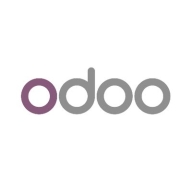

Oracle E-Business Suite and Odoo compete in the enterprise resource planning (ERP) category. Oracle has an advantage in stability and comprehensive integration, while Odoo excels in flexibility, open-source options, and cost-effectiveness for SMEs.
Features: Oracle E-Business Suite offers extensive business integration across various modules, enabling seamless management of enterprise processes, financials, HR, and supply chain operations. Its customization capabilities and ease of integration with different modules enhance adaptability for diverse business requirements. Odoo provides a flexible, open-source platform with strong user adaptability and a wide range of modules that cater to specific enterprise needs, making it ideal for small to medium businesses due to its simple integration methods.
Room for Improvement: Oracle E-Business Suite experiences challenges with integration, user experience, and outdated UI components, requiring streamlined processes and less complex customizations. Odoo lacks depth in industry-specific functionalities and advanced integration options, with users wanting enhanced reporting, automation, and third-party app integrations.
Ease of Deployment and Customer Service: Oracle E-Business Suite offers deployment flexibility, generally favoring on-premise setups, with customer service feedback being moderate, noting variable responsiveness. Odoo supports cloud deployment options with favorable customer service due to an active community and straightforward support, driven by its user-centric approach.
Pricing and ROI: Oracle E-Business Suite is associated with high costs due to complex licensing and support fees, making it less accessible to smaller businesses, yet delivering a notable ROI through productivity enhancements. Odoo offers budget-friendly pricing appealing to SMEs with its open-source and modular model, keeping initial costs low and flexible, highlighting affordability and wide accessibility.
Currently, I manage those tasks independently, which is a significant cost-saving measure for my small business.
I have definitely seen ROI from Oracle E-Business Suite in terms of cost savings and time savings.
Technical support from Odoo is available and eager to help.
I have communicated with the technical support of Oracle E-Business Suite through our local vendor who connects with us weekly to diagnose our ERP system and provide us with quick solutions for stability management.
Reporting bugs and getting feedback, as well as having engineers work on issues, was very transactional.
I rate the scalability of Odoo as eight to nine out of ten.
I find Oracle to be much better than other ERPs like SAP or IFS, being easier and more comfortable for everyone.
I would say it's fairly easy to scale.
The solution has good scalability, which I would rate around eight out of ten.
Stability is very important because any software that supports your business must be available consistently.
I assess that Oracle E-Business Suite is stable and reliable, as our full server is in our control, making it totally secure for our organization because it is not cloud-based.
The system is very stable.
Odoo's documentation needs improvement, as there are areas that are not well-documented.
I should be able to customize the screen or application without needing technical support.
Oracle E-Business Suite could improve by transitioning from Java-based scripts in our system to a web-based environment.
We are moving to the cloud and are looking at the cloud version of it for the cost of ownership and a more modernized integrated platform.
The pricing for Odoo is affordable, with the solution being significantly cheaper than its competitors like SAP, Microsoft, and Oracle.
Each license costs a significant amount.
Oracle pricing is comparatively high to other vendors.
I find the pricing is not ideal for a smaller organization right now.
The CRM and sales tools are highly effective, with customizable proposal templates aiding client interactions.
As a core user of both Oracle and IFS ERP, I can visit all the modules at the same time. This helps me synchronize all the data across all modules, enabling me to show management how the organization works, how each module functions, and how people can get the information they need from the right sources.
Oracle E-Business Suite provides standard APIs for integrating with custom applications.
It allows us to normalize all of our systems into a single database.
| Product | Market Share (%) |
|---|---|
| Oracle E-Business Suite | 4.0% |
| Odoo | 2.6% |
| Other | 93.4% |


| Company Size | Count |
|---|---|
| Small Business | 28 |
| Midsize Enterprise | 5 |
| Company Size | Count |
|---|---|
| Small Business | 43 |
| Midsize Enterprise | 33 |
| Large Enterprise | 113 |
Odoo is a suite of open source business apps that cover all your company needs: CRM, eCommerce, accounting, inventory, point of sale, project management, etc. Odoo's unique value proposition is to be at the same time very easy to use and fully integrated.
Oracle E-Business Suite (EBS) is considered the most extensive offering of amalgamated worldwide business applications available. Oracle EBS helps facilitate medium to large business enterprise organizations with the ability to enhance critical decision-making processes, streamline business procedures, minimize costs, and improve overall performance and productivity.
Oracle EBS runs as a complement to Oracle Database software. The applications serve to automate such processes as supply chain management (SCM), human resource management (HRM), customer relations management (CRM), project portfolio management (PPM), financial management, service management, and more.
Oracle EBS runs best in the cloud. It is a cost-saving option that offers greater productivity and can immediately and easily respond to changing dynamic business needs with an intuitive, automated scalable cloud infrastructure.
Below are some of the valuable features of popular application offerings available within Oracle EBS:
Supply Chain Management (SCM): Every possible supply chain process can be fully automated, from planning, creation, and appropriation to development and fulfillment, delivering a comprehensive solution application to ensure organizations have robust, intelligent-driven, value-added chains. Some applications include:
Human Resource Management (HRM): The solution offers a sturdy group of outstanding human resource processes that enable users to improve productivity, enhance overall business performance, and lower TCO. Some processes include:
Customer Relations Management (CRM): This application provides for a streamlined, unique global gathering of information that will ensure all selling channels are continually following the organization's objectives and protocols. Some features include:
Project Portfolio Management (PPM): Oracle EBS provides a comprehensive, full lifecycle offering of project and portfolio management. Users get a single fully transparent view of all project-related ventures coupled with a superb performance process that grants users the ability to choose the best, most dynamic portfolio ventures.
Financial Management: Users are able to perform more effectively, improve productivity and efficiency, develop productivity tools and integrated performance management, and develop processes for shared services to reduce overall operating costs. Some features include:
Service Management: This application allows users access to the best data necessary to provide correct, precise, reliable information to their clients to ensure that every expectation is exceeded and consistently satisfied.
Reviews from Real Users:
Kopano R., Freelancer at a tech services company, says, “What I found most valuable in Oracle E-Business Suite is the patching because it is straightforward. As long as you follow Oracle's best practices, you are able to finish the task of patching without a problem. I like that it's also easy to add products, e.g. if you want to add on financials, you can, or if you don't have financials, you can expand on that. I like that Oracle E-Business Suite is really scalable.”
Mohammed G., Senior Oracle Application Consultant at a comms service provider, writes, “Oracle E-Business Suite consists of a lot of streams, such as financial and HR processes of the enterprise companies. We are using most of the Oracle financial modules, and we have an Oracle stream, FI procurement stream, and HR streams, which have a lot of applications. Oracle E-Business Suite has over 20 different modules to choose from, it is comprehensive. Additionally, the integration is very good. “
We monitor all ERP reviews to prevent fraudulent reviews and keep review quality high. We do not post reviews by company employees or direct competitors. We validate each review for authenticity via cross-reference with LinkedIn, and personal follow-up with the reviewer when necessary.